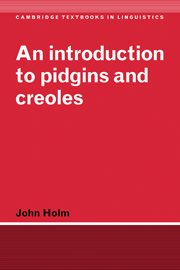1 - Introduction
Published online by Cambridge University Press: 05 June 2012
Summary
Pidgins and creoles and linguistics
What earlier generations thought of pidgin and creole languages is all too clear from their very names: broken English, bastard Portuguese, nigger French, kombuistaaltje (‘cookhouse lingo’), isikula (‘coolie language’). This contempt often stemmed in part from the feeling that pidgins and Creoles were corruptions of ‘higher’, usually European languages, and in part from attitudes toward the speakers of such languages who were often perceived as semi-savages whose partial acquisition of civilized habits was somehow an affront. Those speakers of Creole languages who had access to education were duly convinced that their speech was wrong, and they often tried to make it more similar to the standard. With few exceptions, even linguists thought of pidgin and Creole languages as ‘aberrant’ (Bloomfield 1933:471) if they thought of them at all – that is, as defective and therefore inappropriate as objects of serious study. The analogy seemed to be that broken English, for example, was of as little interest to the linguist as a broken diamond would be to a gemologist.
It is only comparatively recently that linguists have realized that pidgins and Creoles are not wrong versions of other languages but rather new languages. Their words were largely taken from an older language during a period of linguistic crisis to fill an urgent need for communication. This makes them appear to be deformed versions of that older language.
- Type
- Chapter
- Information
- An Introduction to Pidgins and Creoles , pp. 1 - 13Publisher: Cambridge University PressPrint publication year: 2000



